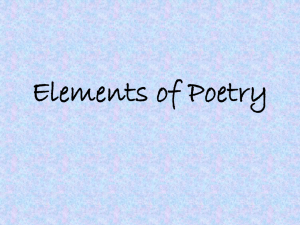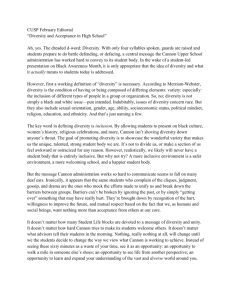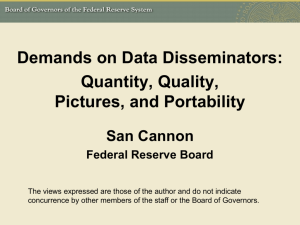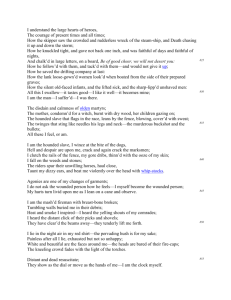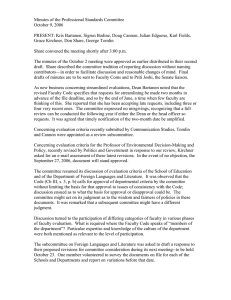References and Supplemental Reading for:
advertisement
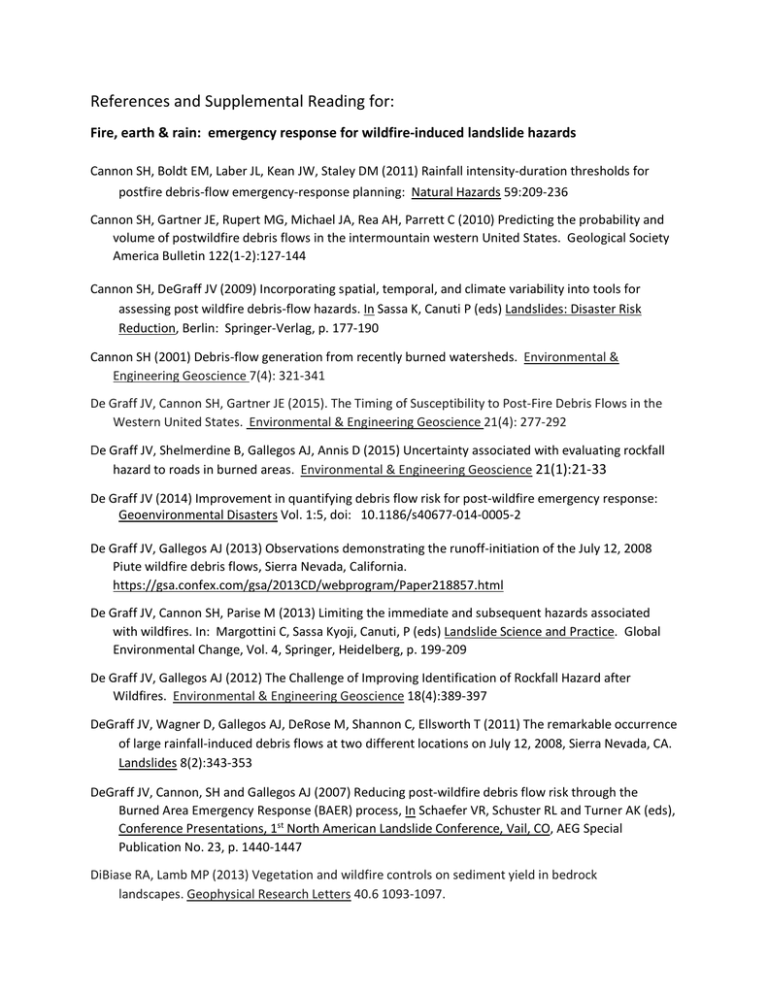
References and Supplemental Reading for: Fire, earth & rain: emergency response for wildfire-induced landslide hazards Cannon SH, Boldt EM, Laber JL, Kean JW, Staley DM (2011) Rainfall intensity-duration thresholds for postfire debris-flow emergency-response planning: Natural Hazards 59:209-236 Cannon SH, Gartner JE, Rupert MG, Michael JA, Rea AH, Parrett C (2010) Predicting the probability and volume of postwildfire debris flows in the intermountain western United States. Geological Society America Bulletin 122(1-2):127-144 Cannon SH, DeGraff JV (2009) Incorporating spatial, temporal, and climate variability into tools for assessing post wildfire debris-flow hazards. In Sassa K, Canuti P (eds) Landslides: Disaster Risk Reduction, Berlin: Springer-Verlag, p. 177-190 Cannon SH (2001) Debris-flow generation from recently burned watersheds. Environmental & Engineering Geoscience 7(4): 321-341 De Graff JV, Cannon SH, Gartner JE (2015). The Timing of Susceptibility to Post-Fire Debris Flows in the Western United States. Environmental & Engineering Geoscience 21(4): 277-292 De Graff JV, Shelmerdine B, Gallegos AJ, Annis D (2015) Uncertainty associated with evaluating rockfall hazard to roads in burned areas. Environmental & Engineering Geoscience 21(1):21-33 De Graff JV (2014) Improvement in quantifying debris flow risk for post-wildfire emergency response: Geoenvironmental Disasters Vol. 1:5, doi: 10.1186/s40677-014-0005-2 De Graff JV, Gallegos AJ (2013) Observations demonstrating the runoff-initiation of the July 12, 2008 Piute wildfire debris flows, Sierra Nevada, California. https://gsa.confex.com/gsa/2013CD/webprogram/Paper218857.html De Graff JV, Cannon SH, Parise M (2013) Limiting the immediate and subsequent hazards associated with wildfires. In: Margottini C, Sassa Kyoji, Canuti, P (eds) Landslide Science and Practice. Global Environmental Change, Vol. 4, Springer, Heidelberg, p. 199-209 De Graff JV, Gallegos AJ (2012) The Challenge of Improving Identification of Rockfall Hazard after Wildfires. Environmental & Engineering Geoscience 18(4):389-397 DeGraff JV, Wagner D, Gallegos AJ, DeRose M, Shannon C, Ellsworth T (2011) The remarkable occurrence of large rainfall-induced debris flows at two different locations on July 12, 2008, Sierra Nevada, CA. Landslides 8(2):343-353 DeGraff JV, Cannon, SH and Gallegos AJ (2007) Reducing post-wildfire debris flow risk through the Burned Area Emergency Response (BAER) process, In Schaefer VR, Schuster RL and Turner AK (eds), Conference Presentations, 1st North American Landslide Conference, Vail, CO, AEG Special Publication No. 23, p. 1440-1447 DiBiase RA, Lamb MP (2013) Vegetation and wildfire controls on sediment yield in bedrock landscapes. Geophysical Research Letters 40.6 1093-1097. Florsheim JL, Keller EA, Best DW (1991) Fluvial sediment transport in response to moderate storm flows following chaparral wildfire, Ventura County, California. Geological Society of America Bulletin 103:504-511 Florsheim JL, Chin A, O'Hirok LS, Storesund, R. (2015). Short-term post-wildfire dry-ravel processes in a chaparral fluvial system. Geomorphology 252:32-39 Gartner JE, Cannon SH, Santi PM, deWolfe VG (2008) Empirical models to predict the volumes of debris flows generated by recently burned basins in the western U.S. Geomorphology 96:339-354 Giraud RE, McDonald GN (2007). The 2000–2004 fire-related debris flows in northern Utah, In Schaefer VR, Schuster RL and Turner AK (eds), Conference Presentations, 1st North American Landslide Conference, Vail, CO, AEG Special Publication No. 23, p. 1522-1531. Lamb MP, Scheingross JS, Amidon WH, Swanson E, Limaye A (2011) A model for fire-induced sediment yield by dry ravel in steep landscapes. Journal of Geophysical Research 116, F03006, doi: 10.1029/2010JF001878 Parise M, Cannon SH (2012) Wildfire impacts on the processes that generate debris flows in burned watersheds. Natural Hazards 61:217-227 Moody JA, Shakesby RA, Robichaud PR, Cannon SH, Martin DA (2013) Current research issues related to post-wildfire runoff and erosion processes: Earth Science Reviews doi: 10.1016/j.earscirev.2013.03.004 Santi P, Cannon S, De Graff J (2013) Wildfire and landscape change, In Shroder, JF (ed), Treatise on Geomorphology Vol. 13, San Diego: Academic Press, pp. 262–287 Santi PM, Morandi L (2013) Comparison of debris-flow volumes from burned and unburned areas. Landslides 10(6), 757-769 Santi PM, de Wolfe VG, Higgins JD, Cannon SH, Gartner JE (2008) Sources of debris flow material in burned areas. Geomorphology 96:310–321 Staley DM, Kean JW, Cannon SH, Schmidt KM, Laber JL (2013) Objective definition of rainfall intensity– duration thresholds for the initiation of post-fire debris flows in southern California. Landslides 10(5), 547-562. Longer video of Lake Isabella flow https://youtu.be/GX4TFBAuL3s
